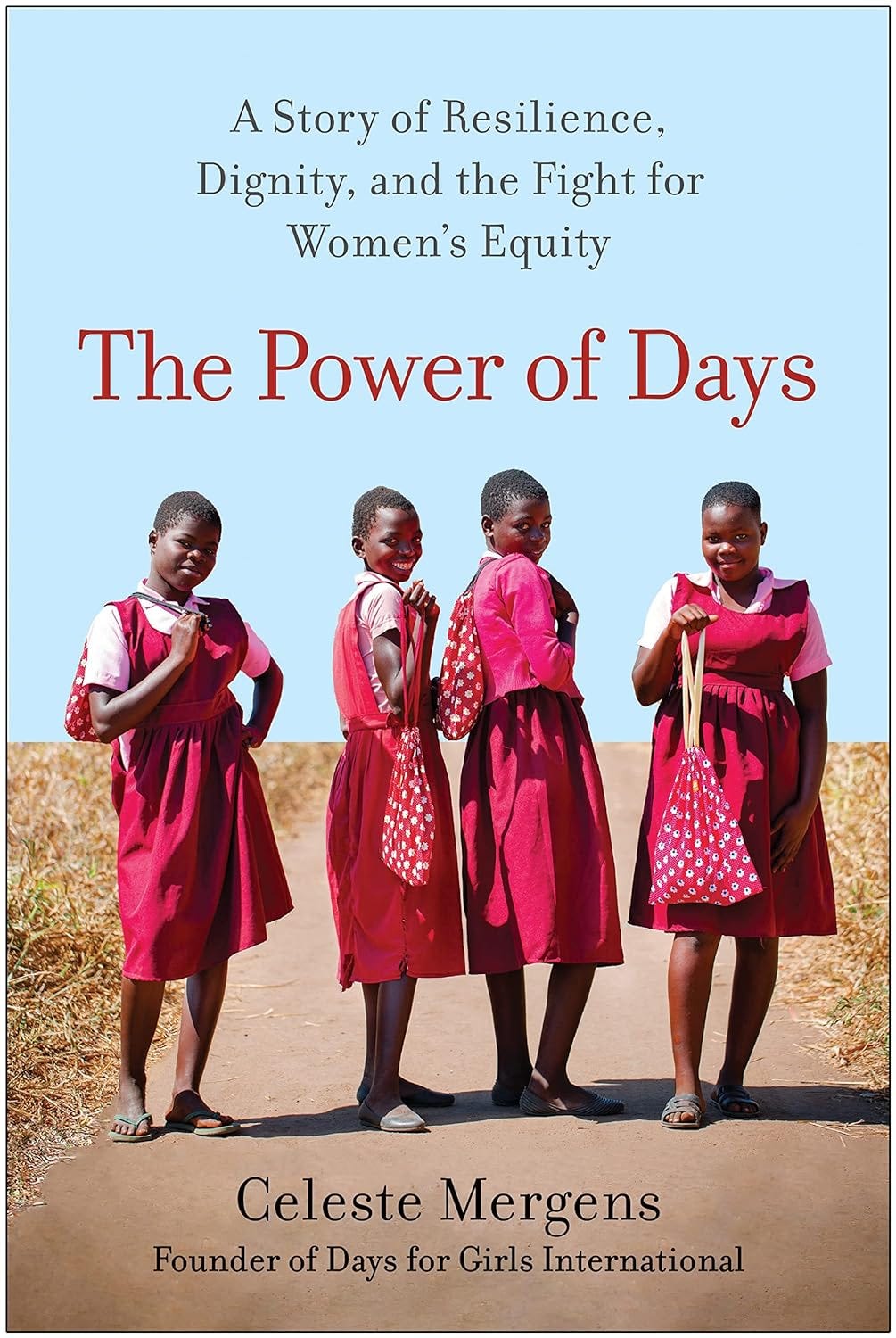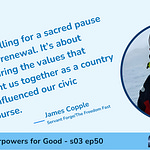Remember, you can watch the Superpowers for Good show on e360tv. To view the episode, download the #e360tv channel app to your streaming device–Roku, AppleTV or AmazonFireTV–or your mobile device. You can even watch it on the web.
When you purchase an item after clicking a link here, we may earn a commission. It’s an easy way to support our work.
Devin: What do you see as your superpower?
Celeste: I have to say that it's probably gratitude.
Celeste Mergens founded Days for Girls, the global nonprofit serving millions of women in over 140 countries, 15 years ago. The founding story–which I’ve heard before–moved me to tears–again.
You know those moments when your whole life is about to change? Only you don't know it yet. This was most definitely one of those moments. I had been in Kenya, where I was learning to work with a family foundation and helping the community there in Kenya in a remote area to have more self-sustaining, suitable solutions.
We were invited to visit the slums of Kibera. While we were there, we were invited to see an orphanage nearby. At first, I was hesitant, but of course, I believe in saying yes. The children captured my heart. What I didn't know was that although I brought sustainable solutions there as well, post-election violence would create a terrible upheaval where half a million people were displaced.
So, this orphanage went from 420 to a reported 1,400 kids, and we were doing everything we could to assist, but it was not enough. Then I got the call that they were completely out of food and had been for days. I happened to be someone who has experienced childhood hunger that included going without food for days. I knew what that felt like. I wanted to address that, but we had done everything we could, and we were returning in just three and a half weeks.
So, fast forward–waking up at 2:30 in the morning after pleading for some kind of solution to come to mind to raise the money they needed.
I woke up with it going through my mind. “Have you asked what the girls are doing for feminine hygiene?” I literally gasped because I hadn't thought to ask that. I ran to the computer and got an immediate, unexpected answer–they didn't have smartphones everywhere back then–and the answer was only this, “Nothing.”
They wait in their rooms, it turned out, Devin. They were sitting on pieces of cardboard for days. No access to education, no access to even taking care of themselves. I wanted to change that. What I didn't know was that they were going to teach me.
Just a few weeks later, thanks to amazing volunteers, we were able to bring washable pads that we devised because I knew that if a family chooses between food and hygiene, food wins and should. So, how do we give them something they could count on month after month?
We brought these washable pads, which needed innovation. They weren't ideal then, and I could say that–I designed them. When we brought the education that went with it, which was a stretch for me at the time, they came up afterward and, with big smiles and hugs holding their kits, said, “Thank you so much because before you came, we had to let them use us if we wanted to leave the room and go to class.”
I was hoping that didn't mean what I feared it meant, but it turned out they were being exploited in exchange for a single disposable pad. That was the moment Days for Girls was born.
Shunning credit, Celeste sees the success of Days for Girls as “evidence of the power of we. It's like the New York, New York of movements. If you can do this with periods, you can do it with anything.”
Her new book, The Power of Days, recounts the story of the nonprofit's incredible journey to global impact.
Just 15 years ago, the discussion of menstruation was so taboo that after being invited to speak at events, organizers sometimes learned of Celeste’s topic and canceled the invitations. A woman’s organization that provided financial support backed out of the relationship to avoid being associated with periods.
“It was remarkable,” she says. “It just seems absurd now.” Today, it is commonplace to talk about feminine hygiene, even in what we have discretely called “mixed company.”
Celeste describes her superpower as gratitude. She notes that it is vital to building a successful team. The success of her team is undeniable.
AI Episode Summary
Celeste Mergens founded the nonprofit organization Days for Girls 15 years ago to address the lack of access to feminine hygiene products and education in impoverished regions.
The organization has reached over 3 million women and girls in 145 countries through the efforts of volunteers and local leaders.
Celeste's new book, The Power of Days, tells the story of how Days for Girls started and highlights the power of gratitude and listening in creating positive change.
Gratitude is Celeste's superpower, enabling her to see the good in the world and overcome challenges.
She believes that focusing on what unites us rather than our differences can foster collaboration and create positive impact.
Celeste shares an example of how she used inclusive dialogue to engage with female genital cutters in Kenya and successfully reduce the prevalence of the practice.
She emphasizes the importance of recognizing that circumstances do not define us and that we have the power to make new choices.
Celebrating achievements and expressing gratitude as a team can energize and motivate people to tackle new challenges.
Celeste believes that gratitude and a focus on what's possible can help address current issues and bring about positive change in the world.
She encourages readers to embrace gratitude and inclusive conversations to make the impossible possible and create a more united and compassionate society.
How to Develop Gratitude As a Superpower
Celeste makes the case for gratitude being a superpower, noting, “By having gratitude, you can overcome trauma easily. You can see new viewpoints. It really is a superpower.”
Her experience as a child helped her develop gratitude as an adult. “Honestly, it derives in part from having been raised in poverty. I'm grateful for things most people wouldn't be grateful for because of what I went through.”
Vitally, Celeste explains the impact of gratitude on teams:
It also helps teams work better. So if you are working with A-type, like go-achieve team members, we tend to focus on next, next, next. When we finish something, put a beautiful checkmark.
If you stop just long enough to go, “We just took that mountain. We were after it. Let's stop for a minute. We did that. That goal was accomplished, everybody. Yes, we did it. Thank you.” If you do that, then you have the energy to charge over to the next mountain.
Her gratitude helps her to see beyond the present. “I recognize that we are not our circumstances. Not at all. We are not what we own or don't own. We are not what people label us. We are the choices we make. And even those don't define us because we can make new choices. I know that with my entire being.”
She offers additional advice for changemakers. “As we work together in our world, it shouldn't, in my opinion, be about what's different, what differences we have, or even how awful it is right now, whatever that fill-in-the-blank is, but rather what's possible. What would we love? Who in the world would also love that? Look for where we come together.”
Using this principle, she worked with the cutters in Kenya who were performing female genital mutilation (she avoids that phrase so as not to insult her new friends in that community) to reduce the practice.
She recognized the cultural significance of the practice. She helped the practitioners see all the related traditions regarding rights of passage to womanhood that they also led and encouraged them to keep those that didn’t harm the girls.
After the meeting, several immediately agreed to stop, acknowledging that cutting negatively impacted intimate relationships within marriage, such that men were more likely to cheat and bring home HIV. They were seeing this happen.
By following Celeste’s example and advice, you can expand your gratitude. With deliberate effort, you can make it a superpower that enables you to do more good in the world.
Guest Profile
Celeste Mergens (she/her):
Founder and former CEO, Days for Girls International
About Days for Girls International: Days for Girls, a global award-winning organization championing Women's Health and Menstrual Health Equity, working toward a day when periods are never a problem for anyone. Days for Girls was named by the Huffington Post as a ‘Next Ten’ Organization poised to change the world in the next decade and has reached 2.9+ million women and girls in 145 countries.
Website: DaysforGirls.org
Other URL: ThePowerofDaysBook.com
Twitter Handle: @DaysforGirls
Biographical Information: Celeste Mergens is an author, thought leader, and changemaker and has been featured in Oprah’s O Magazine, Forbes, and Stanford Social Innovation Review. She is the Founder of Days for Girls, which has reached 2.9+ million women and girls in 145 countries.
Typically averaging 52 speaking events a year, she was awarded the AARP Purpose Prize, Conscious Company Global Impact Entrepreneur Top Ten Women, 2019 Global Washington Global Hero, and Women's Economic Forum's Woman of the Decade. She is married to her best friend of forty years, Don.
Website: CelesteMergens.com
Twitter Handle: @Celeste_Mergens

















